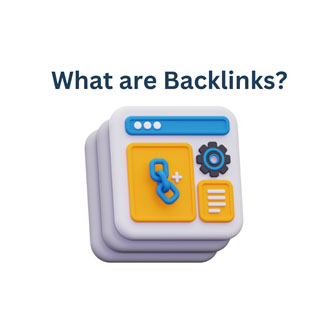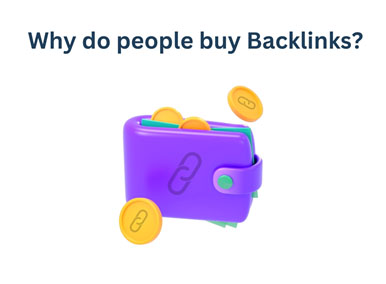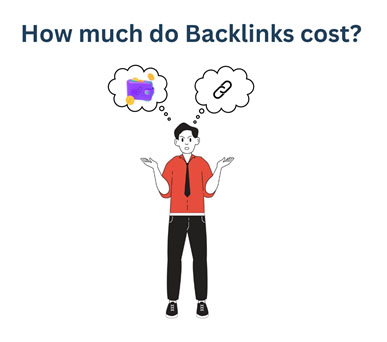What are Backlinks?
Backlinks are links from one website to another. They act as pathways that connect different web pages across the internet. When a website links to another site, it’s like giving it a vote of confidence or recommendation. Backlinks are important for SEO because search engines like Google use them to evaluate the credibility and authority of a website.

Websites with more high-quality backlinks tend to rank higher in search engine results pages SERPs. Think of backlinks as references in a research paper – the more reputable sources you cite, the more credible your paper becomes. Similarly, the more quality websites link to your site, the more trustworthy and valuable it appears to search engines, ultimately improving your website’s visibility and traffic.
Why do people buy Backlinks?
In simple terms, people buy backlinks because they believe it will help their websites rank higher in search engine results pages (SERPs). Let’s break down why this is the case and why some people resort to buying backlinks:

1. Search Engine Optimization (SEO): Backlinks are like upvotes for a website in the eyes of search engines like Google. When other websites link to your site, it signals to search engines that your content is valuable and trustworthy. As a result, search engines are more likely to rank your website higher in search results, making it easier for people to find.
2. Authority and Trustworthiness: Backlinks from reputable and authoritative websites can boost your site’s credibility and trustworthiness. If well-respected sites are linking to yours, it suggests that your content is reliable and worthy of attention. This can lead to increased traffic, engagement, and conversions on your website.
3. Traffic Generation: Backlinks can also drive direct traffic to your website. When users click on a link from another site and land on yours, it increases your site’s visibility and potentially introduces your brand to new audiences. This can result in more leads, sales, and opportunities for growth.
4. Competitive Advantage: In competitive industries, having a strong backlink profile can give you an edge over competitors. If your competitors have many backlinks pointing to their sites, it may be challenging to outrank them without a comparable number of quality backlinks. Buying backlinks can be seen as a shortcut to levelling the playing field and gaining a competitive advantage.
Buying Backlinks: A risky affair?
Buying backlinks, also known as link purchasing or link building, refers to the practice of paying other websites to link back to your site. While it may seem like a shortcut to improve search engine rankings and increase website traffic, buying backlinks is a risky affair that can have serious consequences for your website’s reputation and search engine visibility.
Here’s why buying backlinks is risky, explained in simple terms:
1. Violation of Search Engine Guidelines: Search engines like Google have strict guidelines against buying and selling links to manipulate search rankings. When you buy backlinks, you’re essentially trying to deceive search engines into believing that your website is more authoritative and credible than it actually is. This violates search engine guidelines and can lead to penalties, including lower rankings or removal from search results altogether.
2. Low-Quality Backlinks: Many websites that offer backlinks for sale are low-quality or spammy sites with little to no relevance or authority. These sites may engage in black hat SEO tactics, such as link farming or link schemes, to artificially inflate their own rankings. By associating your website with these low-quality backlinks, you risk damaging your site’s reputation and credibility in the eyes of both search engines and users.
3. Risk of Algorithmic Penalties: Search engines continuously update their algorithms to detect and penalise websites engaged in manipulative link building practices. If your website is found to have unnatural or spammy backlinks, it may be subject to algorithmic penalties, such as Google’s Penguin algorithm, which specifically targets link spam. Recovering from such penalties can be time-consuming and challenging, requiring the removal or disavowal of harmful backlinks and a reconsideration request to search engines.
4. Wasted Resources: Buying backlinks can be costly, and the resources spent on purchasing links could be better invested in legitimate SEO tactics, such as creating high-quality content, improving website usability, and earning organic backlinks through outreach and relationship-building. While buying backlinks may provide short-term gains, the long-term risks and consequences far outweigh any potential benefits.
5. Loss of Trust and Credibility: Users and potential customers value trust and credibility when browsing the web. If they discover that your website has acquired backlinks through unethical means, it can damage their trust in your brand and deter them from engaging with your site or making purchases. Building a reputable online presence takes time and effort, and shortcuts like buying backlinks can undermine your efforts to establish trust and credibility with your audience.
In conclusion, buying backlinks is a risky affair that can harm your website’s reputation, search engine visibility, and credibility. Instead of resorting to manipulative tactics, focus on creating high-quality content, providing value to your audience, and earning backlinks organically through ethical means. By adhering to search engine guidelines and prioritising user experience and authenticity, you can build a sustainable and successful online presence that stands the test of time.
How much do Backlinks cost?
Backlinks are links from one website to another. They are important for search engine optimization (SEO) because search engines like Google use them to determine the relevance and authority of a website. In simple terms, backlinks act as “votes of confidence” from other websites, indicating that your site is trustworthy and credible. As a result, having high-quality backlinks can improve your website’s visibility in search engine results pages (SERPs) and drive more organic traffic to your site.

Now, let’s talk about the cost of backlinks. Backlinks can vary widely in cost depending on various factors such as their quality, relevance, and the authority of the linking site. Here’s a breakdown of the different types of backlinks and their potential costs:
1. Natural Backlinks: Natural backlinks are links that are earned organically, without any payment or incentive. These are the most valuable type of backlinks because they are based on genuine endorsements from other websites. However, earning natural backlinks requires creating high-quality content that is valuable and relevant to your target audience. While natural backlinks don’t have a direct cost, they do require investment in content creation, promotion, and outreach efforts.
2. Manual Outreach Backlinks: Manual outreach backlinks involve reaching out to other website owners or bloggers and requesting them to link to your site. This method often requires creating a compelling pitch or offer that incentivizes other website owners to link to your content. The cost of manual outreach backlinks can vary depending on whether you do it yourself or hire a professional SEO agency to handle the outreach process. Some agencies may charge a flat fee per link or offer monthly retainer packages for ongoing link building efforts.
3. Guest Posting Backlinks: Guest posting involves writing and publishing articles on other websites in exchange for a backlink to your site. This method can be effective for building backlinks and establishing authority in your niche. The cost of guest posting backlinks can vary depending on the authority and popularity of the target website. Some websites may accept guest posts for free, while others may charge a fee for publishing guest content with a backlink.
4. Paid Backlinks: Paid backlinks are links that are acquired through monetary transactions, such as buying links from link marketplaces or paying for sponsored content placements. While paid backlinks can be a quick way to acquire links, they are generally frowned upon by search engines like Google and can result in penalties if detected. Additionally, the cost of paid backlinks can add up over time and may not provide long-term benefits for your website’s SEO.
In summary, the cost of backlinks can vary depending on the method used and the quality of the links acquired. While some backlinks may be obtained at little to no cost through organic methods like creating valuable content and outreach efforts, others may require investment in resources, time, or professional services. It’s important to prioritise quality over quantity when acquiring backlinks and focus on building a diverse and natural backlink profile that reflects the authority and relevance of your website.
Why do Backlinks cost so much?
Backlinks are links from one website to another. They’re important in the world of digital marketing because search engines like Google use them as one of the factors to determine the ranking of websites in search results. Essentially, the more high-quality backlinks a website has, the higher it’s likely to rank in search engine results pages (SERPs).
Now, why do backlinks sometimes cost so much? Let’s break it down into simpler terms:
1. Supply and Demand: Imagine you have a website, and you want it to rank higher in Google searches. One way to do that is to get backlinks from other websites. However, not all websites are willing to link to yours for free. If your website is popular or has valuable content, many other website owners might want to link to it because it can benefit their own website’s SEO. As a result, the demand for backlinks from popular websites can be high, and this drives up the price.
2. Time and Effort: Creating high-quality backlinks takes time and effort. It involves reaching out to other website owners, convincing them to link to your website, and ensuring that the links are placed in relevant and authoritative contexts. This process can be time-consuming and may require the help of skilled professionals such as SEO specialists or digital marketers. As a result, website owners often charge a fee for their time and expertise in acquiring backlinks.
3. SEO Value: Backlinks are valuable for SEO because they signal to search engines that your website is trustworthy and authoritative. However, not all backlinks are created equal. Search engines prioritise backlinks from reputable and relevant websites. Websites with high domain authority, strong relevance to your content, and natural link profiles are more likely to provide valuable backlinks. Therefore, website owners may charge more for backlinks from websites with these characteristics because they offer greater SEO value.
4. Risk and Quality Control: Building backlinks can sometimes be risky, especially if done in ways that violate search engine guidelines (such as buying links or engaging in link schemes). Low-quality or spammy backlinks can actually harm a website’s SEO rather than help it. Website owners who sell backlinks often take measures to ensure that the links they provide are high-quality and comply with search engine guidelines. This may involve vetting potential linking websites, monitoring the quality of backlinks over time, and offering guarantees or refunds in case of issues. These additional efforts contribute to the cost of backlinks.
In summary, backlinks can cost a lot because of factors such as supply and demand, the time and effort required to acquire them, their SEO value, and the need for risk management and quality control. Website owners are willing to pay for high-quality backlinks because they can significantly improve their website’s visibility and ranking in search engine results, ultimately driving more traffic and potential customers to their site.
Conclusion
In conclusion, buying backlinks is not a good option for improving your website’s SEO. It may seem like a quick fix, but it can lead to penalties, wasted money, and damage to your website’s reputation. Instead, focus on creating high-quality content that naturally attracts backlinks from reputable sources. Build relationships with other websites and influencers in your industry to earn genuine, valuable backlinks over time. By taking a proactive and ethical approach to link building, you’ll see sustainable improvements in your website’s visibility and ranking in search results.